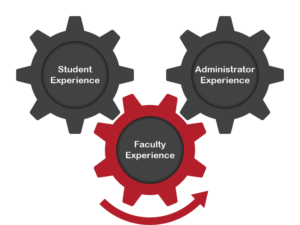How Academic Administrators Can Improve Online Learning: The Faculty Experience

This article is part of a series on the impact of administrative decisions on the online classroom. Be sure to check out the other articles in the series, which address the student experience and the administrator experience.
Perhaps more than any other group, faculty members must simultaneously serve several constituencies at an educational institution. At the course level, they must facilitate content and help students meet learning outcomes, and at the program level, they must work with administrators and other faculty members to ensure their instruction aligns with the institution’s goals.
Academic administrators are key in helping create a successful experience for all constituencies at an institution, including students, faculty members, and themselves. This article focuses on how administrators such as deans and program coordinators can improve the faculty experience as they balance the needs of those they serve.

Faculty Experience Factors
The student experience is often only as good as the faculty members who create it. Therefore, properly supporting online faculty members as they develop and facilitate curriculum is crucial to the success of any online initiative. Thus, administrators must provide instructors with a clear understanding of what quality means to the institution as well as a process for getting to that point. Most importantly, institutions should train and incentivize faculty members as they work on online curriculum to help engage them with the initiative.
Faculty Guidance and Procedures
An institution should always communicate its vision for its online programs to the faculty members involved in developing and facilitating online courses. The following are steps administrators can take to support faculty members appropriately:
- Create and document broad level expectations regarding online development and facilitation.
- Create unified policies about what instructors can and cannot edit in live term shells.
- Create an online-specific intellectual property policy for all course writers that ensures long-term viability of online courses.
- Create professional guidelines for meeting copyright, Americans With Disabilities Act, and Section 508 standards.
- Create professional standards for course design and facilitation.
- Incorporate all of the above into a comprehensive online faculty handbook that is regularly updated.
Similar to how students should be set up for success in their online endeavors, faculty members should also be given the resources, guidelines, and infrastructure they need to effectively build and/or teach their online courses. Suggestions like those above help ensure that faculty expectations are tempered, which sets the stage for them to build and teach online courses that speak not only to their professional expertise, but the institutional vision for online programs.
Faculty and Incentives
Ensuring that faculty members are aligned with institutional policies is just as important as creating them. With online courses in particular, institutions have the opportunity to create a uniform experience, which not only is good for students, but may also minimizes the amount of work faculty members have to do on course development. Toward that end, administrators should consider implementing the following infrastructure:
- Define an appropriate workload for the development and facilitation of online courses, and factor this into a faculty member’s teaching load.
- Create an appropriate incentive plan for the development of online courses.
- Create contracts that articulate the above and that reference institutional standards and policies as well.
- Require faculty members to review the faculty handbook, perhaps by having them take a brief quiz on its content.
As with any workplace, transparency regarding compensation and expectations is key. This helps ensure that the faculty members creating and teaching these courses are aware of the institution’s expectations, can manage their time, and know how they’ll be compensated for their work.
Curriculum Consistency
For students, the more consistent their experience, the better that experience. Establishing a unified consensus about what online courses should look and feel like to students and then implementing that consensus in all online courses will have a significant impact on student achievement and confidence over the course of a program. Consider the following infrastructure elements:
- Implement a consistent look and feel for all course shells, including proper branding.
- Develop syllabus templates that spell out a consistent, best-practice-aligned set of procedures and expectations.
- Implement a unified and best-practice-aligned layout for all courses for instructional delivery.
- Create institutional rubrics for common assignment types.
- Leverage content templates to assist faculty members in writing and organizing content so it integrates with the above practices.
By deciding on these consistent elements and making them part of the course design and delivery process, administrators will help ensure that students have an equitable experience from course to course.
Faculty Ownership and Engagement
Including department leaders and faculty members in the development of the online initiative should be a priority. Administrators should give faculty members every opportunity to have a constructive voice in defining their programs’ strategies and fostering a culture that values robust and effective online instruction. Here are some strategies to help with faculty engagement:
- Define the extent to which departments should individually control the format of their program’s course content, and delegate that authority appropriately.
- Clearly differentiate between departmental and institutional responsibilities in the realm of online course development and facilitation.
- Identify a department-level product owner to coordinate and facilitate the execution of departmental responsibilities by program.
- Create a process for gathering faculty input and feedback while planning out the development and improvement of online programs.
- Create a transparent and timely peer review process for newly developed courses.
Creating this type of infrastructure will help increase faculty buy-in, which will then ideally increase their engagement in the course design and delivery processes. Because faculty members are the ones who will ultimately serve as the face of the institution (either through the courses they teach or those they develop), helping them connect to the vision and feel ownership over it are critical to an online program’s success.
Professional Development
Online education is constantly changing, so institutions should make it a priority to provide faculty members with regular access to professional development opportunities in their fields. The following steps should be considered:
- Develop and publish an annual schedule of professional development opportunities for faculty members in the field of online education.
- Collect a wide range of evidence and metrics (survey results, student achievement rates, etc.) for planning professional development both at the institution and program level.
- Create online learning courses for faculty use, or direct faculty members toward appropriate resources over time.
- Define professional development as a part of faculty members’ workload, and monitor attendance and participation at all professional development opportunities.
- Use a tailored evaluation tool beyond student survey data to measure the quality of online course facilitation.
- Create professional development requirements for all online faculty members, such as periodic completion of best-practice courses as well as attendance at professional development events.
By keeping faculty members up to date on the latest updates in the field, you ensure that the students enrolled in your courses are receiving an education that aligns with industry trends and best practices.
Conclusion
As the face of an institution’s online endeavors, faculty members play a critical role in the success of any program. By ensuring that faculty members have the resources they need, believe in the institutional vision, and have the tools to build a consistent and fulfilling student experience, institutions will set up their students for success.
For more information on how academic administrators can positively impact the online classroom experience, explore the other articles available in this series:
- How Academic Administrators Can Improve Online Learning: The Student Experience
- How Academic Administrators Can Improve Online Learning: The Administrator Experience
